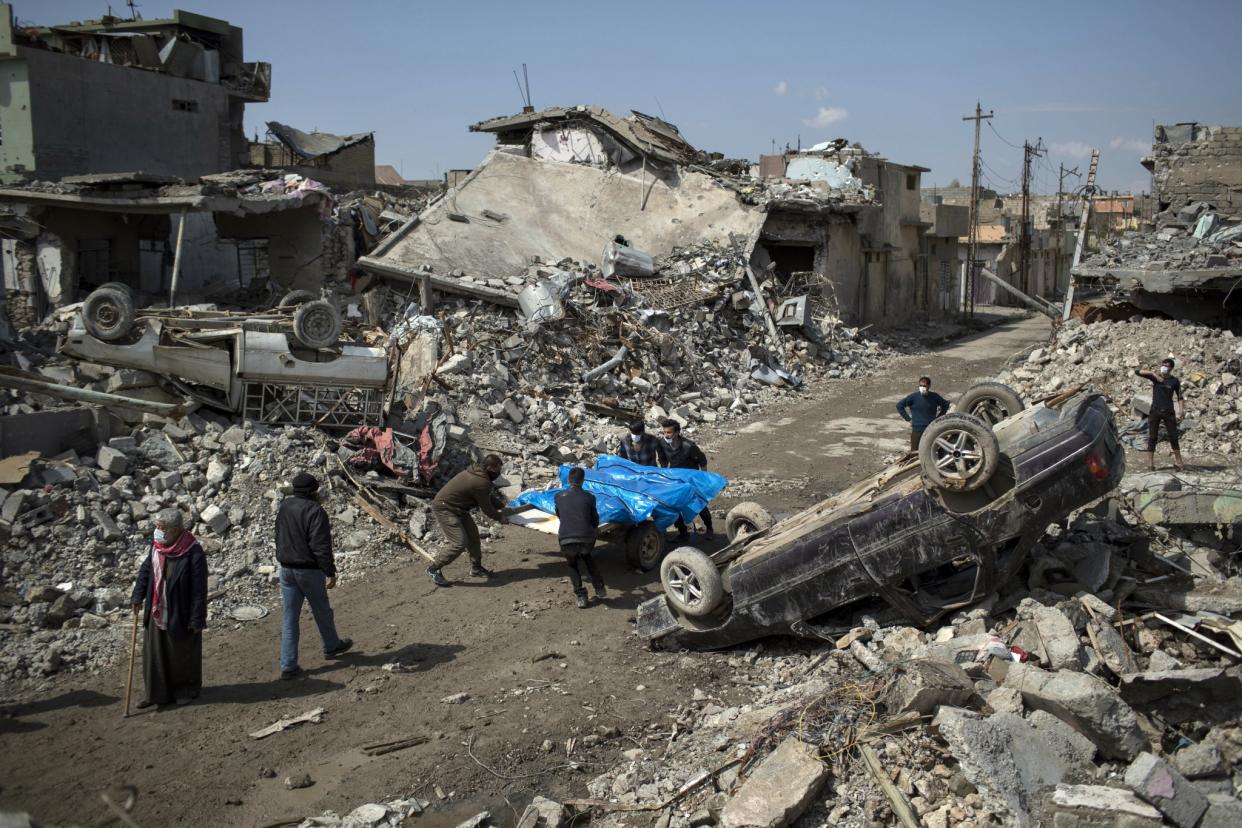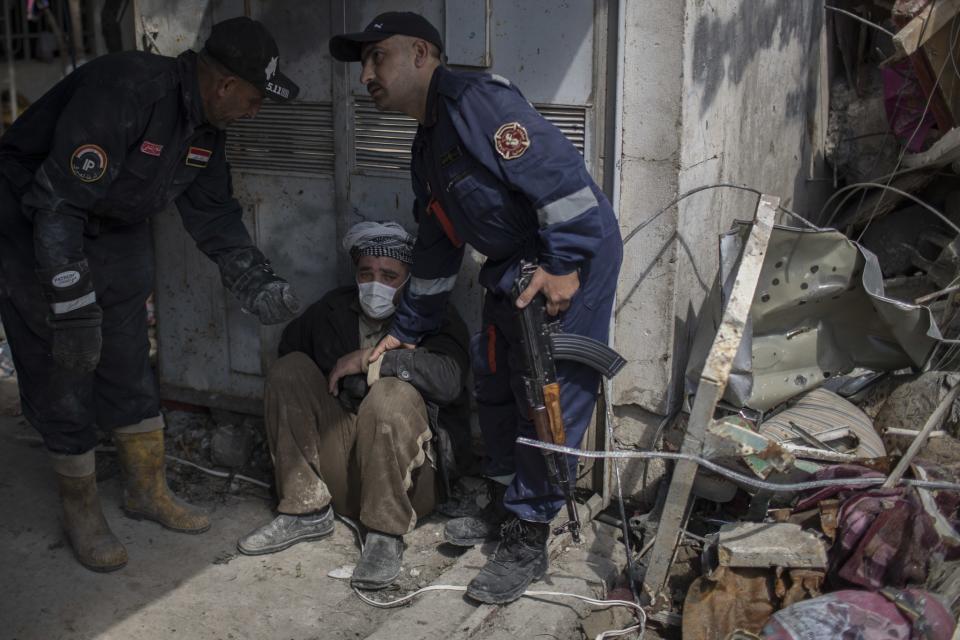Eyewitnesses describe deadly airstrike in Iraqi neighborhood

MOSUL — In the West Emergency Hospital in Irbil, 30-year-old Lina described the sound and the smell after an airstrike hit a house in the west Mosul neighborhood of Jadida. “I heard the sound of fire, I could smell the burnt meat of people. The place got hotter and hotter — I just wanted to escape. I screamed for help,” she said.
The airstrike happened on March 17 during an intense battle between Islamic State snipers and Iraqi forces. Iraqi officials and eyewitnesses believe as many as 240 people were killed. Civil defense rescue workers say they’ve pulled at least 140 bodies from the rubble. Other humanitarian groups have cited numbers as high as 300, but no official tally has been offered.
Lina’s voice shook as she described the events to Yahoo News. She was in a house that was struck from the air, she estimated at around 4 o’clock in the afternoon.
“I was standing in front of the window, and the airstrike came toward me. I jumped into a hole [in the floor] to protect myself. All the glass struck me. I couldn’t see anything after that.”
Her face is marred with scratches, and her right eye is nearly sealed shut. “We were about 150 people in the house, I wasn’t alone. The house collapsed on the people and it became one floor. I realized I was injured; there was a lot of blood.”
Lina said it took four days for rescuers to get her out of Jadida and to a hospital. She lost her son and her husband. Her two other children have been taken to other hospitals. She doesn’t know their fate.

The details about what actually happened at Jadida remain murky. While the United States military admitted carrying out an airstrike on March 17, the Iraqi military released a statement saying it called for one at 8:25 a.m., but not in the afternoon. It blamed the destruction and deaths on the detonation of ISIS explosives.
Journalists have been banned from the site since the weekend, and further investigation of the scene has not been possible. A military commander, not authorized to speak to the media, let it slip that the order to ban journalists came from the Iraqi prime minister. Yahoo News has not been able to independently verify the information.
But eyewitness accounts from the neighborhood confirm that the strike on the housing units took place in the afternoon, and they say the Iraqi military knew there were many civilians.
A man from the neighborhood, Ali, was at the hospital with his brother, who was suffering from injuries and awaiting surgery. He told Yahoo News his house was near the area where the strike hit and he saw Iraqi forces. “They were hiding in houses, about 30 meters away. They knew [we were there]. They were next to our neighborhood,” he said.
Ali also said there were only a few ISIS fighters moving in and out of the houses, and the snipers were on the rooftops. “There were a lot of foreign fighters with ISIS,” he said, “We realized that once the [foreign] fighters were killed, the others [Iraqi fighters] would run away.”
A 26-year-old father, Alla, was waiting at the hospital to see his surviving daughter. He lost his wife in the attack. His house was near the attack site. He said that two days before the attack, during heavy fighting, he used a phone that he hid from ISIS in his shoe to call for help. “I called an emergency number, there’s a number to call for help to the Iraqi forces, but no one came.”

During the airstrike, Alla saw many people running, but he was trapped. “I was terrified,” he told Yahoo news. “The airstrike hit my house. I couldn’t get my wife, but I pulled out my daughter [from rubble].”
According to a Human Rights Watch report, protocol for the Iraqi military to call for air support has recently changed. Under previous rules, all requests for coalition air support had to be approved and made through an authorized “strike cell” unit in Baghdad, but now HRW reports the current policy may allow brigade commanders on the ground “to request the coalition to carry out air-strikes without an additional layer of authorization.”
Iraqi journalists who have been with military divisions have said it is common to see a commander call for a coalition air support and usually it only takes a few minutes for the strike to hit.
U.S. Army spokesperson Col. Joe Scrocca told Yahoo News, “All of our strikes are cleared both by the Iraqi government and a coalition officer.” He added, “We vet [the locations] and make sure there’s no friendly forces around the area.”
He said the investigation into the airstrike is ongoing, but that American officials only learned of the allegations six days after the strike. “When the story first broke, I believe on the 23rd, was when we saw it via social media,” he said. “We had to go back, based on the grid coordinates that were given to us and other media sources.”
But Scrocca also admitted that the U.S. doesn’t necessarily rely on American investigators to conduct assessments. “We take any evidence the Iraqi army or the government can provide us. We’ll take any information; we analyze social media posts, photos, interviews with witnesses, as well as our own strike logs. In many cases we’re not able to send a team on the ground.”

He hopes in this case they will be able to do an on-the-ground investigation, as Jadida has been declared a liberated area.
But since February, when the push to retake west Mosul began, airstrikes have come under heavy criticism. After an investigation, an Amnesty International report said it is concerned the Iraqi military is not allowing civilians to flee and pressuring them to stay in their homes, endangering them further. “The shocking spike in civilian casualties from both US-led coalition airstrikes and ground fighting between the Iraqi military and IS fighters in recent months has also raised serious questions about the lawfulness of these attacks,” the report said.
According to the coalition media team, 479 strikes hit near Mosul from Oct. 17 to Jan. 31 during the Iraqi military’s operation to take back the eastern part of the city. In West Mosul, a more densely populated area, in the last 53 days there have be 255 airstrikes logged.
Survivors of the attacks say that ISIS fighters forced residents to move from house to house, making civilian casualties more likely.
Outside the hospital, Ali said, “I was living in the neighborhood next to Jadida, but they [ISIS] forced us to move there. ISIS then came to my house [in Jadida] and used my house as a base. They used one of the rooms for injured [fighters]. They used it like a clinic. They used our fuels without permission.”
Another man from Jadida, Khalid, spoke to Yahoo News over the phone. He said his family was also moved: “ISIS forced us to leave our house, and so we went to another house where there were a lot of people. It was a small house and we couldn’t sleep.” He believes the fighters were using the civilians as shields.
On the day of the attack, Khalid said, he was able to move to another house down the road from the attack site. “There was some fighting near us. We knew the Iraqi army was nearby and thought ‘They will liberate us,’” he said, “When the airstrikes started, they hit [several] houses one by one. It was loud, like drums, I know the sound of the aircraft.”

Khalid lost his brother in the attack. When he went out to the rubble, he saw his brother’s body. “I recognized him, but I couldn’t get him out, so I put an ID on his body for the [rescuers]. It was a terrifying situation.”
Reports emerged that there was a truck filled with explosives at the strike site, but none of the eyewitness who spoke with Yahoo News were able to confirm this. The Iraqi military said the houses may have been booby-trapped, but none of the witnesses saw the explosives or trip wires. Ultimately, they all agree that amid the heavy exchange of fire between the Iraqi forces and ISIS, an airstrike caused chaos, killing their relatives and friends — a horror none of them can forget.
——
Ash Gallagher is a journalist covering the Mideast for Yahoo News.
Read more from Yahoo News:


